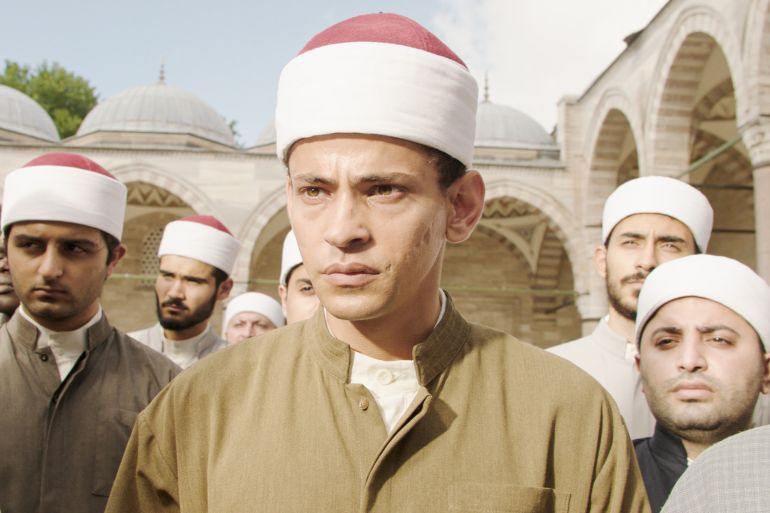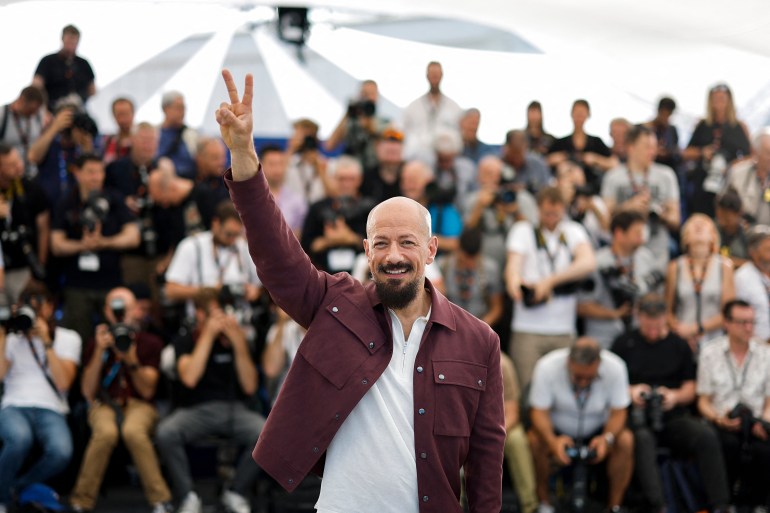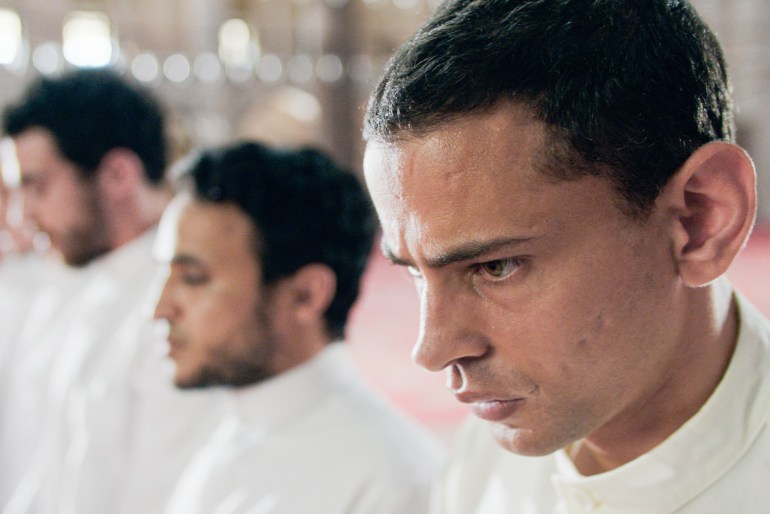Boy from Heaven: Tarik Saleh’s thriller set in Egypt’s Al-Azhar
Saleh’s new film, which depicts religious power struggles and corruption in Egypt, premiered at Cannes Film Festival.

Cannes, France – Tarik Saleh, the Swedish-Egyptian director whose new film Boy from Heaven premiered in the competition section of the Cannes Film Festival this week, makes light of being called bold and brave for his work.
“I know Egyptians and Saudis who go out and say the truth. [They] go to jail, get tortured, get out and tell the truth again. Those are brave people,” he told Al Jazeera.
Keep reading
list of 3 itemsMichael Winterbottom: ‘This is a film we made for people in Gaza’
The Kashmir Files: Singapore bans film praised by India’s Modi
“I have a Swedish passport. I live in Europe. I shot the film [that is set in Cairo] in Istanbul,” he says.
Nevertheless, Boy from Heaven is set to ruffle feathers with its portrayal of corruption, hypocrisy, and power struggles within Egypt’s religious establishment and the state.
The film is a thriller about Adam (played by Tawfeek Barhom), a young man from a fishing community in northern Egypt who receives a grant to study Islamic thought at Cairo’s prestigious Al-Azhar University only to become embroiled in a conspiracy to elect the next grand imam. It is a story of spying and scandal, informants and assailants, intrigues and killings.
Film critic Peter Bradshaw praised the “intersection between a conspiracy-thriller and a more general human drama” in the film.
“Boy from Heaven reminded me a little bit of the English author John Le Carré, who of course writes about spying and the human cost of that job,” he told Al Jazeera. “[Saleh] is also boldly challenging the corruption of church and state,” says Bradshaw.
Saleh’s last outing, The Nine Hilton Incident, won the World Cinema Grand Jury Prize: Dramatic at the 2017 Sundance Film Festival but was banned in Egypt for its portrayal of corruption in the country’s police.
Saleh thinks that it is his job to make films without thinking of the potential fallout.
“I believe that as an artist, you must tell the truth; the emotional truth because there is no objective truth. If you are specific, and you’re trying to be honest, and you don’t speculate, there is a chance to actually say something [of significance] through cinema,” he says.

The film’s setting in one of the most renowned educational institutions for Sunni Muslims makes it highly unusual.
“How many would have known about Al-Azhar and the grand imam before they saw the film?” Saleh asks.
Boy from Heaven tries to present a rounded view of the religious world, warts and all – the factionalism within the faith in Al-Azhar, the divides between the liberals and conservatives – but it is not an attack on the Islamic faith itself.
Saleh thinks the most controversial aspects will be in its portrayal of the state security’s interference in the religious establishment, and the abuse of power – be it by an individual or an institution.
“Power is a double-edged sword. It can easily cut your own hand,” asserts the lead protagonist, Adam, in the film.
Saleh believes he has a responsibility to tell these kinds of stories.
“Egyptians who live in Egypt cannot tell the story. It’s impossible to do so. Egypt is a military dictatorship.”
‘I am someone else I don’t like to be’
Raised in Stockholm by a Swedish mother and an Egyptian father, Saleh, 50, calls himself an “everyday Muslim”.
“I don’t fast as much as I should, I don’t pray as much, I drink alcohol every now and then. I know five verses that you need to know to be able to pray but I don’t know the whole Quran by heart like my grandfather and grandmother did,” he says.
His grandfather, incidentally, studied at Al-Azhar – which sparked Saleh’s curiosity and desire to make a film about the university.
Saleh worked closely with an imam while he was writing the film’s script because he wanted it to be theologically correct, and he was mindful of the pervasiveness of Islamophobia in popular culture. “We had incredible discussions. I enjoyed asking him all the forbidden questions and he had these beautiful explanations,” he says.
Saleh is keen to stress that Boy from Heaven is fictional. The only real figure in the film is President Abdel Fattah el-Sisi, but even he is only present as a photograph on the wall. The real grand imam of Al-Azhar, Sheikh Ahmed Mohamed el-Tayeb, is someone Saleh has described in a news conference as a “sophisticated voice of reason in a region full of crazy voices and megalomaniac leaders”.
Al-Azhar itself is a modern educational institution that also teaches subjects like medicine and computer science and has female students.
“What I have done is married history with how things are today to create a parallel reality,” he says.
Saleh thinks that human beings need to constantly ask themselves the question that forms the last line of his film: “What did you learn?” It is the line that motivated Barhom to take up the lead role.
“It’s a journey. It’s about growing up in these places which might rob you a little of youth, but you get to a point to be the best version of yourself, to deal with anything life throws at you,” Barhom said in a news conference.

Ultimately, Saleh believes the film has universal resonance, in that it is about people struggling with the conflict between what they believe in and what they have to do.
He said this conflict applies to his own work, and describes himself as a reluctant director who makes films because others cannot and because he does not trust other directors with his writing, as well as for more prosaic reasons.
“I am a father of two children. I must put food on the table. And as a director, I get paid well, because people think I’m good at it,” he laughs.
He said he finds being on the sets a tortuous process; he loves being with the cast and crew, but hates commanding them.
“I am someone else that I don’t like to be,” he says. “I must be like a general who is sacrificing people and it’s very harsh. It’s brutal. I feel like I’m a guy who’s just sending people off to die,” he says.